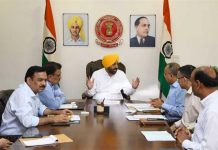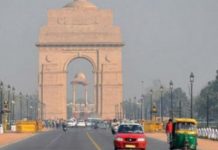
Congress Vice-President and putative prime ministerial candidate Rahul Gandhi told a TV news channel last week he believed his party would win this year’s Lok Sabha election. Given that a spate of opinion polls have predicted a drubbing for the shambolic Congress party, shocked commentators asked, does he really think so? If those around Rahul are to be believed, no, he doesn’t think the Congress is coming back to power. In fact, Rahul is beginning to reconcile himself to the possibility of the Congress scoring its worst-ever tally in Parliament, lower than the 114 it won in 1999. But Rahul is also increasingly of the view that the BJP, his party’s principal rival and the favourite of the opinion polls to form the next government, is going to be disappointed. And that in the BJP’s failure to score enough numbers would lie the chance of the Congress.
First, why Rahul has begun to accept that a third successive term in New Delhi is too uphill for his flamed-out party. “We have allowed the grass to grow under our feet for too long,” rues a key adviser of Rahul’s, wiser on hindsight. Yes, the quarterbacks of India’s most famous dynast concede, he should have been projected as the party’s prime ministerial nominee long ago. “When Rahul says he isn’t interested in power, he actually speaks the truth,” says an insider wryly. “But that’s also why he appears to have no killer instinct.”
Aides now say Rahul should have played on the front foot far more, aggressively dominating the government’s agenda instead of keeping a polite distance from PM Manmohan Singh, whose insipid leadership of the past four years has made his UPA-2 regime too toxic to defend. Aides also accept Rahul has no credible answers on why he didn’t act on corruption charges against his party’s governments and leaders, at the Centre and in Maharashtra and Himachal Pradesh.
Aides and advisers have been especially foxed by Rahul’s refusal (and of his mother, Congress party president Sonia Gandhi’s, too) to directly attack the BJP’s prime ministerial candidate Narendra Modi even though the Gujarat chief minister himself has been barbecuing them in his public speeches. Surprising aides, Rahul has turned down suggestions that he debunk Modi’s claim of having given good governance to Gujarat since taking charge of the state 12 years ago. He has even put a lid on attempts by the cadres to investigate and expose some of Modi’s claims of development as false. “Rahul has an aversion to dirty politics,” an insider says unhappily.
Another aide, however, insists Rahul is in no torpor and that it is political calculation rather than morals that is shaping his approach. For better or for worse, the Congress vice-president reckons that challenging Modi aggressively on economy and development would be counterproductive, given Gujarat’s rather upbeat economy that appears brighter compared with the national average as well as those of the Congress-ruled states. “The trouble is that Rahul is defensive about his party-led government’s performance, especially its inability to revive the economy and push back the charge of corruption,” he says. “Rahul wants to focus more on his party’s economic prescriptions for the lower classes that are above the poverty line but still outside the middle class.”
Another reason Rahul is reconciling to a Congress downgrade in this summer’s parliamentary election is that nearly the entire rung of the party’s senior citizens has abandoned him. The top guns are alienated by Rahul’s obstinate push for inner-party reforms that aim to break up the old boys’ club and force a culture of transparency. Naturally, this has alarmed the hitherto deeply entrenched interests who are quietly digging in for a prolonged entrenched warfare once the election is over. Since most satraps, and their second-tier leaderships in the states, control the party apparatus in their backyards, Rahul has become a lone ranger in his quest. Old-timers recall how his father, former PM Rajiv Gandhi, had tripped in the 1980s when he tried to radically overhaul the party. A failure to win for his party the forthcoming election would further erode Rahul’s capital, already much depleted in public imagination from losing a string of state elections.
Far-fetched as they may appear, the eerie prospects of an implosive takedown of the Congress party’s original dynasty in case of an electoral rout are real. In fact, the process of choosing candidates for the Lok Sabha election is presaging that later battle, as the old guard and the traditional factions are girding up to fight for Lok Sabha seats for themselves and their factotums. It is increasingly becoming a no-win for Rahul, who realises that while he may need to embrace compromise in distributing nominations, he alone would be blamed for the party’s loss.
Half that battle would be salvaged, though, if the BJP were to fall short of forming the government. That would require the largest Opposition party to be stalled at around 160-odd seats or less, a good deal short of the 272 it would need for a majority in Parliament. Some opinion polls this month have suggested the Congress could get around 100 seats and the non-Congress and non-BJP parties around 180. Rahul believes it would then be opportune for his party to back a Third Front government as it did in 1996 to keep the BJP out. The scenario is now prompting a new thinking in the Rahul camp on how to defeat the BJP. And the answer is the “Muslim voter” model, which suggests that Muslims vote for any candidate that they think is best suited to defeat the BJP.
The argument goes that the Congress should field lightweight candidates in constituencies where it does not have much scope to defeat the BJP, so that the anti-BJP voters consolidate behind a candidate from a third party. The proponents of this tactic are especially suggesting its application in Uttar Pradesh, where the Congress is unlikely to forge an alliance with either of the state’s two biggest parties, the ruling Samajwadi Party and former CM Mayawati’s Bahujan Samaj Party. The return of former Karnataka CM BS Yeddyurappa to the BJP has also thrown up the idea of either a tactical or unspoken alliance with the Janata Dal (Secular) of former PM HD Deve Gowda.
“The fact is that if Modi fails to bring the BJP to power, his political power would be hugely dented,” a Congress leader told TEHELKA. Having been out of power for a decade already, the BJP would then run a risk of falling into disarray, he said, which would give Rahul enough time to reshape the Congress party and be ready for the next election. In any case, in a scenario wherein the Congress party backs a minority Third Front government, Rahul would have the advantage of pulling out the support at a time of his choosing that would trigger a mid-term election, he suggested.
The Rahul camp is also making a distinction between Modi and the BJP. “Modi as PM would be unacceptable to many political parties that cannot win without Muslim votes,” says the Congress leader. Several such parties, including West Bengal CM Mamata Banerjee’s Trinamool Congress and Bihar CM Nitish Kumar’s Janata Dal (United), would be otherwise willing to join the BJP if Modi is kept out. For this reason, the Congress would be happier if the BJP is unable to shake Modi off after the results are out, which would then automatically bring a Third Front to coalesce.
“The funny thing is that over the past two decades, the Congress has lost Lok Sabha polls when it expected to win and won when it expected to lose,” says another leader with a chuckle. As a newly-installed president of the Congress, Sonia had led herself to believe she was well placed to lead her party back to power in 1999, which the incumbent BJP-led coalition unexpectedly won. In 2004, few had given the Congress even an outside chance to topple the NDA government, but the latter unexpectedly lost it.
ajit@tehelka.com













